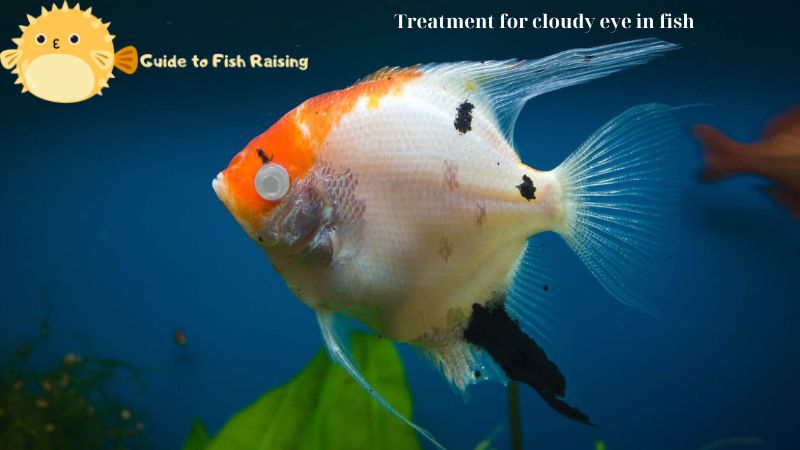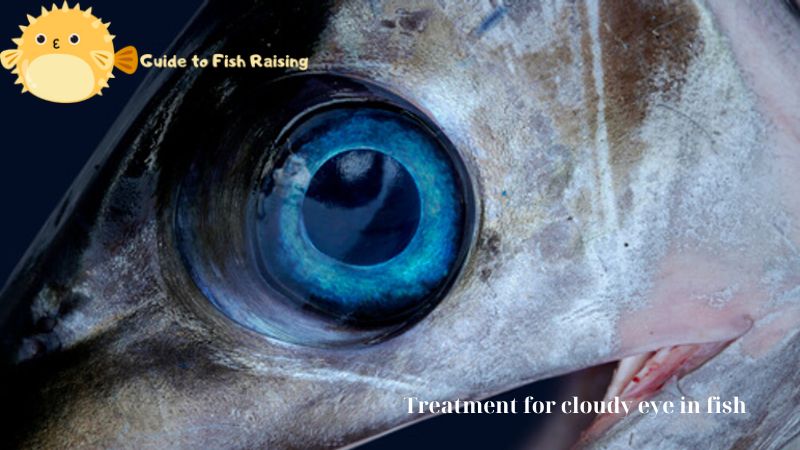Treatment for cloudy eyes in fish is a common condition in both aquarium and pond fish, especially tropical fish. In some cases, it may not actually be a disease, but a symptom of another condition. Below, fishtankenthusiast.com introduces an overview of the condition treatment for cloudy eye in fish, what causes it and how to treat and prevent it.
How do cloudy eye in fish appear?
The good news about this condition is that it is relatively rare and usually not fatal when it occurs, as long as steps are taken to identify and resolve the problem causing it. As its name suggests, the main symptom associated with this condition is that the ankle suddenly turns white, often leading to loss of vision.
What causes this condition?
Determining the cause of cloudy ankles can help you understand the next steps needed to treat or cure the condition. However, be sure to use this article as a general guide, and if you believe your fish may be sick for one or more of these reasons, consider consulting a veterinarian. specializing in fisheries.
Genetics
Fish can sometimes be born with cloudy eyes and this trait can be passed down through genes within families. To be sure of this, you need to make sure your fish’s eyes have always looked like this since hatching. In these cases, cloudiness is usually present in both eyes to a similar extent.
Some species, such as pufferfish and rabbitfish, have a natural white sheen on their eyes, which can easily be mistaken for cloudy eyes. If your fish has cloudy eyes, you should first learn about the species of fish, as it is possible that cloudy eyes are common in your pet’s gene pool.
Ammonia and Nitrate Levels
When it comes to aquarium parameters, you will want to keep ammonia levels at zero and nitrate levels below 20 ppm. You can ensure this by installing an effective filter, changing the water regularly and removing any built-up waste, such as fish waste or uneaten food that may have settled to the bottom of the tank.
This is often overlooked in new aquariums because many people often forget to monitor the nitrogen cycle in their new aquarium.
In short, if you regularly maintain and test the nitrate and ammonia levels in your tank to ensure they are appropriate for your fish species, your fish will not suffer from diseases related to these levels or develop cloudy eyes.
Chlorine and Chloramine poisoning
If you use tap water to fill the tank, make sure the chlorine and chloramines have been removed. You can remove chlorine by injecting air into the water to dissolve the chlorine faster or leaving the water for about 24 hours.
Chloramines can only be removed by water treatment or strong carbon filtration, which can be purchased at your local pet store. If the water is not treated, these substances can irritate the fish’s eyes and cause them to become cloudy, as well as making the fish very sick.
Medicine
You should be careful to only add medication to the aquarium at the correct dosage. If you give too much medication, this can cause eye problems in your fish, such as cloudy eyes, due to an adverse reaction to the medication or because the medication affects the condition of the water.
Diet
A deficiency in vitamin A, a vitamin essential for healthy eyes, can also cause cloudy eyes. If you believe this may be the case, adjusting their diet may be beneficial. Make sure they have the perfect balance of vitamins and minerals to stay healthy and happy.
Without other vitamins, your child’s immune system will be weakened, making him more susceptible to illness and infection, so make sure to give him a balanced diet to keep him healthy.

Physical trauma
When determining the possible cause of a cloudy ankle, it is important to note both. If both eyes are cloudy, it is likely due to illness or infection. However, if only one eye is affected, it is most likely due to physical trauma or eye trauma. Sometimes it’s caused by fish fighting and can cause discomfort.
If you determine the cloudy water condition is due to physical trauma, try to find out when and why this may have occurred. Could it be due to sharp corners or sharp points on some of the decorations in your aquarium?
If it’s not an object, it could be from a fight with a tankmate. If kept with any aggressive species that may have attacked your fish, you may consider moving them to another tank to avoid harm to the fish or even death.
This type of injury will usually heal on its own, but keep a close eye. If your fish has a bacterial eye infection, this can make the cloudy/milky condition worse, so if this happens, be sure to take your fish to the vet.
Cataract
According to fish health experts at Petmd.com, cataracts can be caused by many factors such as poor nutrition, genetic problems and parasites such as eyeworms. Causing one or both eyes to become cloudy, cataracts can eventually cause complete blindness. Sadly, there is currently no known treatment.
Parasites
Parasites, such as eye flukes, are often present in fish tanks but often wait until water conditions are poor or the fish are weak to attack. If you experience an outbreak and you are sure that is the cause, first apply the appropriate medication for your tank. Parasites can damage the fish’s body, causing torn fins, lesions and other symptoms such as cloudy eyes.
Infection
To keep an eye on parasitic infections, let’s look at infections more broadly. While some diseases can be caused by parasites, bacterial or viral infections can cause other diseases. A weakened immune system can expose your fish to infections, causing the main symptom of cloudy eyes as the fish tries to fight off the disease. Parasites and bacteria can be introduced into the tank when new fish are introduced. This is why it is often recommended to quarantine newly brought home fish before releasing them into a community tank.
Treatment for cloudy eye in fish
The first step to treating cloudy eyes is to test your water. Check temperature, pH, and presence of nitrite or ammonia. TDS levels should also be checked. The ammonia level in the pond water must be zero. Don’t be fooled by clear water, this does not mean its quality is up to standard. The best solution is a complete water change, but this must be done carefully, otherwise it could worsen the problem. Any chloramine or chlorine detected must be completely removed. This can be done by injecting air into the water using a water pump or air stone, which will promote chlorine evaporation at a higher rate. However, chloramine must be removed through the use of a heavy carbon filter.
A common mistake fish pond owners make is using too much medication. Products like formalin, if used in too high a concentration or in combination with other products, can actually cause cloudy eyes or make them worse. Any metal-based medications, such as brands that use copper sulfate, should not be combined with water conditioners that remove heavy metals, as they increase the possibility of fatal drug interactions. Never add acid directly to water. Instead, the pH should be adjusted differently, especially for beginners. Your job as a pond owner and fish caretaker is to strengthen their immune system, and the best way to do this is to reduce their stress.
Frequently asked questions
Can cloudy eye disease in fish go away on its own?
Whether or not a fish’s cloudy eyes completely heal on its own depends entirely on the cause and the favorable conditions you create for the fish to recover.
Can cloudy eyes kill fish?
In nature, cloudy eyes can cause fish to die because the fish cannot see. Cloudy eyes can make them extremely vulnerable to predators. In captivity, your fish are more likely to recover.
Since cloudy eyes are a symptom of illness or something wrong rather than an actual illness, it’s best to take it as a sign that something more serious is affecting your fish. your.
The same disease or infection that causes cloudy eyes can be fatal to your fish. Although cloudy eyes do not cause fish to die, the root cause of the problem can cause your pet’s death if you do not seek appropriate treatment.
Is cataract disease in fish contagious?
Cloudy eye disease is a term that describes the symptoms of many different diseases, rather than an infectious disease. However, infections that cause cloudy eyes such as eye flukes and bacteria can be contagious.
Can cloudy eyes be treated?
Cloudy eyes can be treated depending on the cause of the symptoms. If the cloudy eyes are due to a parasitic infection, then using medication in the tank to remove the parasites will often help the eye problem improve.
In other cases, when the eye becomes cloudy due to cataracts or severe trauma, the eye may become permanently cloudy.
Can a fish live with a cloudy eye?
If your fish has one eye that is permanently cloudy, it can continue to live a healthy life as long as the other eye remains clear.





